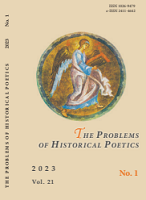Древнерусские и народно-поэтические источники заметки “У России нет прошедшего…” М. Ю. Лермонтова
The Old Russian Literary and Folk-Poetic Genesis of the Note “Russia Has No Past…” in the Context of Mikhail Lermontov’s Historiosophy
Author(s): Irina А. KiselevaSubject(s): Customs / Folklore, Studies of Literature, Russian Literature
Published by: Петрозаводский государственный университет
Keywords: M. Yu. Lermontov; note; Russia Has No Past; Russian statehood; oriental text; Caucasus; history; folklore motifs; ancient Russian literature; genesis;
Summary/Abstract: The subject of the study is Lermontov’s historiosophy, expressed by the poet in the note “Russia has no past…” from the “Notebook presented by V. F. Odoevsky.” The article’s purpose is to identify the ancient Russian and folk-poetic genesis of Lermontov’s note, contributing to the clarification of its semantic content. The figurative system, style and the very substantive essence of the note “Russia has no past…” was formed under the direct influence of ancient Russian texts, adaptations of literary folklore, and the experience of the poet’s personal meeting with representatives of folk culture. The authors propose to consider Lermontov’s sketch an allegorical figure, where the Russian Empire is likened to a mighty hero. In a brief summary of the plot, the poet reflects his understanding of the entire essence of the country’s historical path. As possible sources of the note, the article names the heroic tales in V. Levshin’s literary adaptation, which were popular at the turn of the 19th century, as well as the Caucasian version of the tale about Yeruslan Lazarevich, which existed among the Terek Cossacks. Analogies are drawn between Lermontov’s sketch and the cycle of historical songs about the capture of Kazan, using similar allegories to reveal the theme, as well as the “Kazan History” short novel, the appeals to which are linked to the geopolitical significance of the historical event for the development of the entire old Russian state and, in particular, for the strengthening of its eastern borders. Lermontov’s concept of history is based on his personal perception of historical time, and on the literary, specifically, old Russian, tradition, which is reflected both in the ancient literary monuments and in folklore, which has historical sources. In the note Lermontov looks at the world through the eyes of the people, and is the exponent of the national idea about the spiritual choice of the Russian state.
Journal: Проблемы исторической поэтики
- Issue Year: 21/2023
- Issue No: 1
- Page Range: 35-57
- Page Count: 21
- Language: Russian

